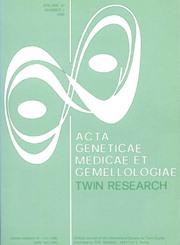No CrossRef data available.
Article contents
The Genetic Control of Blood Pressure under Experimental Stress
Published online by Cambridge University Press: 01 August 2014
Extract
Different forms of cardiovascular disease, including hypertension, give evidence that heredity is a predisposing factor. Yet, family and twin studies of blood pressure have consistently given inconclusive results. In earlier twin studies, Mathers et al (1961) and Osborne et al (1963) presented evidence that blood pressure liability rather than the measured levels of the blood pressure may constitute the critical manifestation of the genetic variable to be investigated.
A twin study has been conducted in which blood pressure measurements were obtained under basal conditions and following experimental stress. The results of this study and comparisons to the earlier studies will be presented.
- Type
- Session 14 - Twin Studies in Cardiovascular Diseases
- Information
- Acta geneticae medicae et gemellologiae: twin research , Volume 19 , Issue 1-2 , April 1970 , pp. 242
- Copyright
- Copyright © The International Society for Twin Studies 1970


